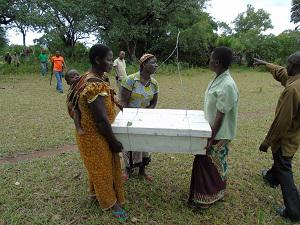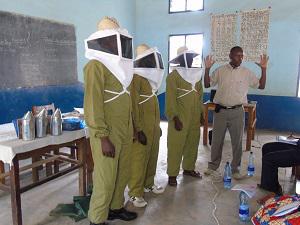Jasson John
To monitor waterbirds and raise environmental awareness. To provide technical know how on income generating activities and establish a pilot village beekeeping project

Women, member of the beekeeping group carrying beehives to the community forest
Malagarasi-Muyovozi Ramsar Site is the largest wetland ecosystem in Tanzania. Since its establishment in 2000, there have been several studies on biodiversity of the area and some of these studies have noted high deforestation rate and overdependence on wetland resources. Unfortunately, findings and recommendations of previous studies have not been shared with the communities.

Ready for Honey harvest. A trainer from Tabora Beekeeping Institute demonstrating how to protect from bee sting
This project is aiming at using the information from previous studies and ongoing waterbirds monitoring program (funded by Tampa’s Lowry Park Zoo) to raise awareness on the importance of the wetlands, threats, and wise use of wetland resources. Through this project, we are aiming at engaging people from the village, ward and district in order to develop a common understanding on the threats and how best the wetland resources could be sustainably managed.
The project is targeting communities in three villages; Lumbe (Tabora Region), Kasisi and Chagu (in Kigoma Region). The three villages are bordering the Ramsar sites, and are all linked to the wetland resources through their activities which include hunting, fishing. In all the three villages, overgrazing has happened mainly from invaders because traditionally communities in the three villages are farmers and not livestock keepers, although in recent years some families do keep few livestock. Moreover, overfishing and use of illegal mesh-size fishing nets have been reported especially at Kasisi and Chagu, both villages near Lake Nyamagoma.
A beekeeping program, as one the income generating activities, will be established in reserved village forests to reduce both overdependence on wetland resources and unsustainable activities such as overgrazing, fire and encroachment in forests. To start with, at least 20 beehives will be set in one of the village, the overall target is that after few years, all three villages will have benefited by establishing their own beekeeping program. Funds, generated from the pilot or initial beekeeping will be revolved for similar project in other villages. Training workshop will be organized drawing members from the three target villages; this will be followed by a study tour to communities where beekeeping programs have been successfully integrated with environmental management at wetlands.